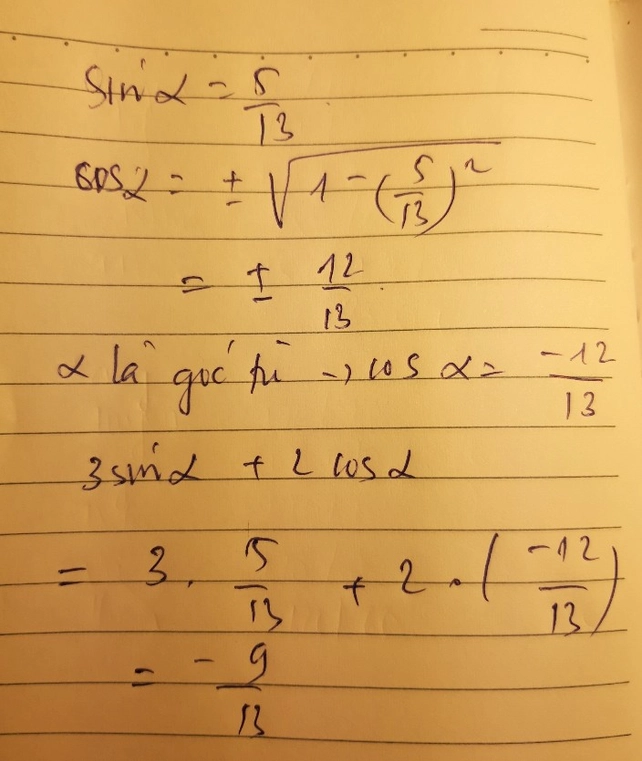cho tan\(x\)=-3. tính giá trị của biểu thức A= \(\frac{sin^2x+sinx.cosx+5}{3sin^2x-2cos^2x}\)
Hãy nhập câu hỏi của bạn vào đây, nếu là tài khoản VIP, bạn sẽ được ưu tiên trả lời.


a, ĐKXĐ: \(x\ne1;x\ne-1\)
b, Với \(x\ne1;x\ne-1\)
\(B=\left[\dfrac{x+1}{2\left(x-1\right)}+\dfrac{3}{\left(x-1\right)\left(x+1\right)}-\dfrac{x+3}{2\left(x+1\right)}\right]\cdot\dfrac{4\left(x^2-1\right)}{5}\\ =\left[\dfrac{x^2+2x+1+6-x^2-2x+3}{2\left(x-1\right)\left(x+1\right)}\right]\cdot\dfrac{4\left(x^2-1\right)}{5}\\ =\dfrac{5}{x^2-1}\cdot\dfrac{4\left(x^2-1\right)}{5}\\ =4\)
=> ĐPCM

a: \(A=\left(x+1\right)\left(x-2\right)-x\left(2x-3\right)+2x^2+4\)
\(=x^2-x-2-2x^2+3x+2x^2+4\)
\(=x^2+2x+2\)
\(a,A=x^2-x-2-2x^2+3x+4+2x^2=x^2+2x+2\\ c,A=\left(x^2+2x+1\right)+1=\left(x+1\right)^2+1\ge1>0\)

điều kiện xác định của phân thức là x khác 0 và x khác -3
nên bạn nhập phân thức vào máy rồi thay x =3 ta có P =1/6

1) \(\left|2x+5\right|\ge21\Rightarrow2x+5\ge21\)hoặc \(2x+5<-21\)<=> \(x\ge8\) hoặc \(x<-13\)
2)
a) |2x-3|>=0 => A>=0-5=-5 => Min A=-5 <=> x=3/2
b) \(\left|2x-1\right|+\left|3-2x\right|\ge\left|2x-1+3-2x\right|=\left|2\right|=2\Rightarrow B\ge2+5=7\)=> MinB=7 <=>x=1
3)
\(\left|2x-1\right|\ge0\Rightarrow-\left|2x-1\right|\le0\Leftrightarrow A\le0+7=7\Rightarrow MaxA=7\Leftrightarrow x=-\frac{1}{2}\)
b)
th1: nếu x<-3/2 => B=-2x-3+2x+2=-1
th2: nếu \(-\frac{3}{2}\le x\le-1\)=> B=2x+3+2x+2=4x+5
ta có:\(-\frac{3}{2}\le x\le-1\Rightarrow-6\le4x\le-4\Leftrightarrow-1\le4x+5\le1\Rightarrow-1\le B\le1\)
th3: nếu x>-1 => B=2x+3-2x-2=1=>
Max B=1 <=> x>-1 hoặc \(-\frac{3}{2}\le x\le-1\)
2b) Áp dụng bất đẳng thức giá trị tuyệt đối: |a| + |b| \(\ge\) |a + b|. Dấu "=" xảy ra khi tích a.b \(\ge\) 0
Ta có: B = |2x - 1| + |3 - 2x| + 5 \(\ge\) |2x - 1+3 - 2x| + 5 = |2| + 5 = 7
=> Min B = 7 khi
(2x - 1)( 3 - 2x) \(\ge\) 0 => (2x - 1)(2x - 3) \(\le\) 0
Mà 2x - 1 > 2x - 3 nên 2x - 1 \(\ge\) 0 và 2x - 3 \(\le\) 0
=> x \(\ge\) 1/2 và x \(\le\) 3/2

a: Ta có: \(N=\dfrac{x^3-1}{x^2-2x+1}\)
\(=\dfrac{\left(x-1\right)\left(x^2+x+1\right)}{\left(x-1\right)^2}\)
\(=\dfrac{x^2+x+1}{x-1}\)
\(=\dfrac{\left(-1\right)^2+\left(-1\right)+1}{-1-1}=\dfrac{1}{-2}=-\dfrac{1}{2}\)
b: Ta có: \(M=\dfrac{x^3+8}{x^2-2x+4}\)
\(=\dfrac{\left(x+2\right)\left(x^2-2x+4\right)}{x^2-2x+4}\)
\(=x+2=0\)
a) \(N=\dfrac{x^3-1}{x^2-2x+1}=\dfrac{\left(x-1\right)\left(x^2+x+1\right)}{\left(x-1\right)^2}=\dfrac{x^2+x+1}{x-1}=\dfrac{\left(-1\right)^2-1+1}{-1-1}=-\dfrac{1}{2}\)b) \(M=\dfrac{x^3+8}{x^2-2x+4}=\dfrac{\left(x+2\right)\left(x^2-2x+4\right)}{x^2-2x+4}=x+2=-2+2=0\)

\(A=\frac{\frac{sin^2x}{cos^2x}+\frac{sinx.cosx}{cos^2x}+\frac{5}{cos^2x}}{\frac{3sin^2x}{cos^2x}-\frac{2cos^2x}{cos^2x}}=\frac{tan^2x+tanx+5\left(1+tan^2x\right)}{3tan^2x-2}\)
\(=\frac{\left(-3\right)^2-3+5\left[1+\left(-3\right)^2\right]}{3.\left(-3\right)^2-2}=...\)